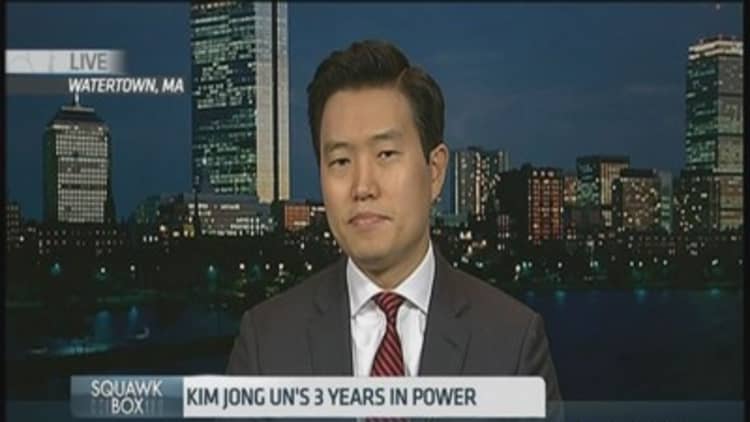More than a week after President Barack Obama announced sanctions on North Korea, officials are hoping to further target and isolate the communist regime where it really hurts—its international finance machine. Access to banks, predominantly in China, allows the rogue state to fund and access everything from weapons materials to luxury goods.
While the vast majority of North Korea's 25 million people live in poverty and isolation, the country's elite—operating mostly from Pyongyang—conducts business using commercial banks abroad. China provides North Korea with the "lion's share" of financial access, said Daniel Glaser, the U.S. Treasury's assistant secretary for terrorist financing.
"Identify financial institutions outside of North Korea that provide points of access—that's exactly what we're doing," Glaser said.
He made the comments Tuesday at a House Foreign Affairs Committee briefing on North Korea's potential cybersecurity, nuclear and missile threats.
"We need to step up and target those financial institutions in Asia and beyond that are supporting the brutal and dangerous North Korean regime," said Rep. Ed Royce, R-Calif., chairman of the House Foreign Affairs Committee.
The Treasury Department on Jan. 2 imposed sanctions on the north in response to the cyberattack on Sony Pictures last November. The actions specifically cited 10 individuals, all North Korean government officials, and three government-controlled entities, all key players in driving the North's economy and weapons program.
The executive order also specifically targeted third-party countries that support the regime. That partly explains why isolating the North financially has been so difficult.
The regime's ruling elite enjoy traveling privileges and sometimes are based around the world to support Kim Jong Un's agenda. U.S. officials have been tracking the regime's global ecosystem—including the use of outside commercial banks—for some time.
"This is an effort that's been going on for 10 years," said Glaser. While U.S. officials have been successful in influencing large Chinese banks to cut financial ties with North Korea, the regime still can access currency through smaller financial institutions, he added.
"We're on the right road," Royce said on efforts to isolate the North financially. "We just want to accelerate it."

North Korea's cyberarmy
The North's strong international ties extend beyond foreign bank accounts.
"North Korea has forged cooperative cyber ties with several other countries including China, Russia, Syria and Iran," according to analysis by Hewlett-Packard released in December. The 10 North Koreans cited in the recent sanctions are posted in China, Russia, Iran, Syria and Namibia, according to the U.S. government.
One point of curiosity about the regime's cyberarmy is how hackers in the North executed the massive Sony data breach, as the FBI has stated. The North's per capita GDP was about $1,800, on par with Ghana, according to 2010 CIA Factbook data.
Read MoreNorth Korea: More cyber warrior than you think
Cybertools, designed to damage targets, are readily available globally through open-source networks, said Gregory Touhill, deputy assistant secretary for cybersecurity operations and programs at the U.S. Department of Homeland Security.
As a point of reference, North Korea does not have Internet access, Touhill said.
Accessing foreign media including DVDs and USB thumb drives of data are punishable offenses. And most technology that makes its way into the North is China-made hardware. The smuggled goods land on North Korea's vast black markets.
Read MoreHow millennials are shaking North Korea's regime
"Given the dilapidated state of North Korea's IT infrastructure, it appears that some of North Korea's cyberactivities are carried out in China, or at the least via servers located in China," said Marcus Noland, an expert on the North's economy. He made the comments in a blog post for the Peterson Institute for International Economics.
The China factor
As the North's international ecosystem for currency access and weapons proliferation evolves, the regime's special relationship with China may prove more useful in coming months. For years, a battery of sanctions against Pyongyang largely has been ineffective in forcing the regime to denuclearize. Some are now hoping to isolate North Korea—and its ruling elite, in particular—using human rights violations.
North Korea's human rights record has been adopted as a U.N. Security Council agenda item—over objections from China and Russia. China is almost certain to veto any resolution that includes a referral to the International Criminal Court. This follows a landmark U.N. report last year that found wide-ranging human rights violations,and accused the regime of "crimes against humanity." The North responded with its own report, saying its citizens enjoy genuine human rights.
"For once North Korea is actually engaging and reacting," said Param-Preet Singh, senior counsel in international justice for Human Rights Watch. "The crimes are perpetrated at the highest level so you're really implicating the leadership," she said.
And targeting the ruling elite ultimately threatens the regime's money-making ecosystem.


